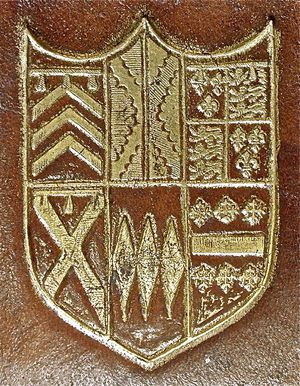Difference between revisions of "Thomas Barrington ca.1585-1644"
(→Books) |
m (David moved page Sir Thomas Barrington to Thomas Barrington ca.1585-1644 without leaving a redirect) |
||
| (2 intermediate revisions by 2 users not shown) | |||
| Line 3: | Line 3: | ||
[[File:BarringtonThomasSir1.jpg| thumb | Armorial stamp of Sir Thomas Barrington (British Armorial Bindings) ]] | [[File:BarringtonThomasSir1.jpg| thumb | Armorial stamp of Sir Thomas Barrington (British Armorial Bindings) ]] | ||
====Biographical Note==== | ====Biographical Note==== | ||
| − | Son of [[family::Sir Francis Barrington, 1st Bart, of Hatfield Broad Oak, Essex]]. Attended [[education::Trinity, Cambridge]] in 1601 but did not graduate; admitted at [[organisations::Gray’s Inn]], 1602. Knighted 1621, succeeded his father as 2nd [[personal title::Baronet]], 1628. Entered the [[organisations::House of Commons]] in 1621 and played an increasingly prominent role in successive parliaments from the late 1620s onwards, supporting an anti-royalist line, with particular interests in religion and moral reform. He became active in raising troops and making military preparations for the parliamentary cause in [[location::Essex]] in the early 1640s. [[occupation::Lay assessor of the Assembly of Divines]], 1643. | + | Son of [[family::Sir Francis Barrington, 1st Bart, of Hatfield Broad Oak, Essex]]. Attended [[education::Trinity College, Cambridge]] in 1601 but did not graduate; admitted at [[organisations::Gray’s Inn]], 1602. Knighted 1621, succeeded his father as 2nd [[personal title::Baronet]], 1628. Entered the [[organisations::House of Commons]] in 1621 and played an increasingly prominent role in successive parliaments from the late 1620s onwards, supporting an anti-royalist line, with particular interests in religion and moral reform. He became active in raising troops and making military preparations for the parliamentary cause in [[location::Essex]] in the early 1640s. [[occupation::Lay assessor of the Assembly of Divines]], 1643. |
====Books==== | ====Books==== | ||
| − | A book bill preserved in the Barrington manuscripts in Hatfield Broad Oak parish library records the purchase of 112 books from the [[location::London]] bookseller [[associates::Richard Whitaker]], 1635-39. The Barrington household account books suggest that books were also being purchased from other sources so Sir Thomas’s library is likely to have run to several hundred volumes. The books bought cover a range of subjects, encompassing [[subject::theology|devotional]] and [[subject::theology|theological]] books, [[subject::law]], [[subject::history]], [[subject::literature]] (including Shakespeare and Herbert), [[subject::geography]] and | + | A book bill preserved in the Barrington manuscripts in Hatfield Broad Oak parish library records the purchase of 112 books from the [[location::London]] bookseller [[associates::Richard Whitaker]], 1635-39. The Barrington household account books suggest that books were also being purchased from other sources so Sir Thomas’s library is likely to have run to several hundred volumes. The books bought cover a range of subjects, encompassing [[subject::theology|devotional]] and [[subject::theology|theological]] books, [[subject::law]], [[subject::history]], [[subject::literature]] (including Shakespeare and Herbert), [[subject::geography]] and travel; an average of [[monetary value::£7]] per year was being spent. Examples: National Art Library Clements AA29; Bodleian Broxbourne 73.5. |
====Characteristic Markings==== | ====Characteristic Markings==== | ||
Latest revision as of 07:28, 3 May 2021
Sir Thomas BARRINGTON ca.1585-1644
Biographical Note
Son of Sir Francis Barrington, 1st Bart, of Hatfield Broad Oak, Essex. Attended Trinity College, Cambridge in 1601 but did not graduate; admitted at Gray’s Inn, 1602. Knighted 1621, succeeded his father as 2nd Baronet, 1628. Entered the House of Commons in 1621 and played an increasingly prominent role in successive parliaments from the late 1620s onwards, supporting an anti-royalist line, with particular interests in religion and moral reform. He became active in raising troops and making military preparations for the parliamentary cause in Essex in the early 1640s. Lay assessor of the Assembly of Divines, 1643.
Books
A book bill preserved in the Barrington manuscripts in Hatfield Broad Oak parish library records the purchase of 112 books from the London bookseller Richard Whitaker, 1635-39. The Barrington household account books suggest that books were also being purchased from other sources so Sir Thomas’s library is likely to have run to several hundred volumes. The books bought cover a range of subjects, encompassing devotional and theological books, law, history, literature (including Shakespeare and Herbert), geography and travel; an average of £7 per year was being spent. Examples: National Art Library Clements AA29; Bodleian Broxbourne 73.5.
Characteristic Markings
Barrington inscribed his name, and sometimes date of purchase, on titlepages; used an armorial stamp.
Sources
- British Armorial Bindings.
- Bohannon, M. A London bookseller’s bill: 1635-1639, The Library 4th ser 18 (1938), 432-46.
- Kyle, Chris R. "Barrington, Sir Thomas, second baronet (c. 1585–1644), politician." Oxford Dictionary of National Biography.
